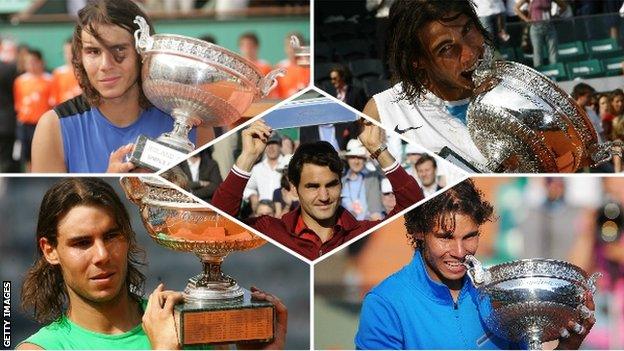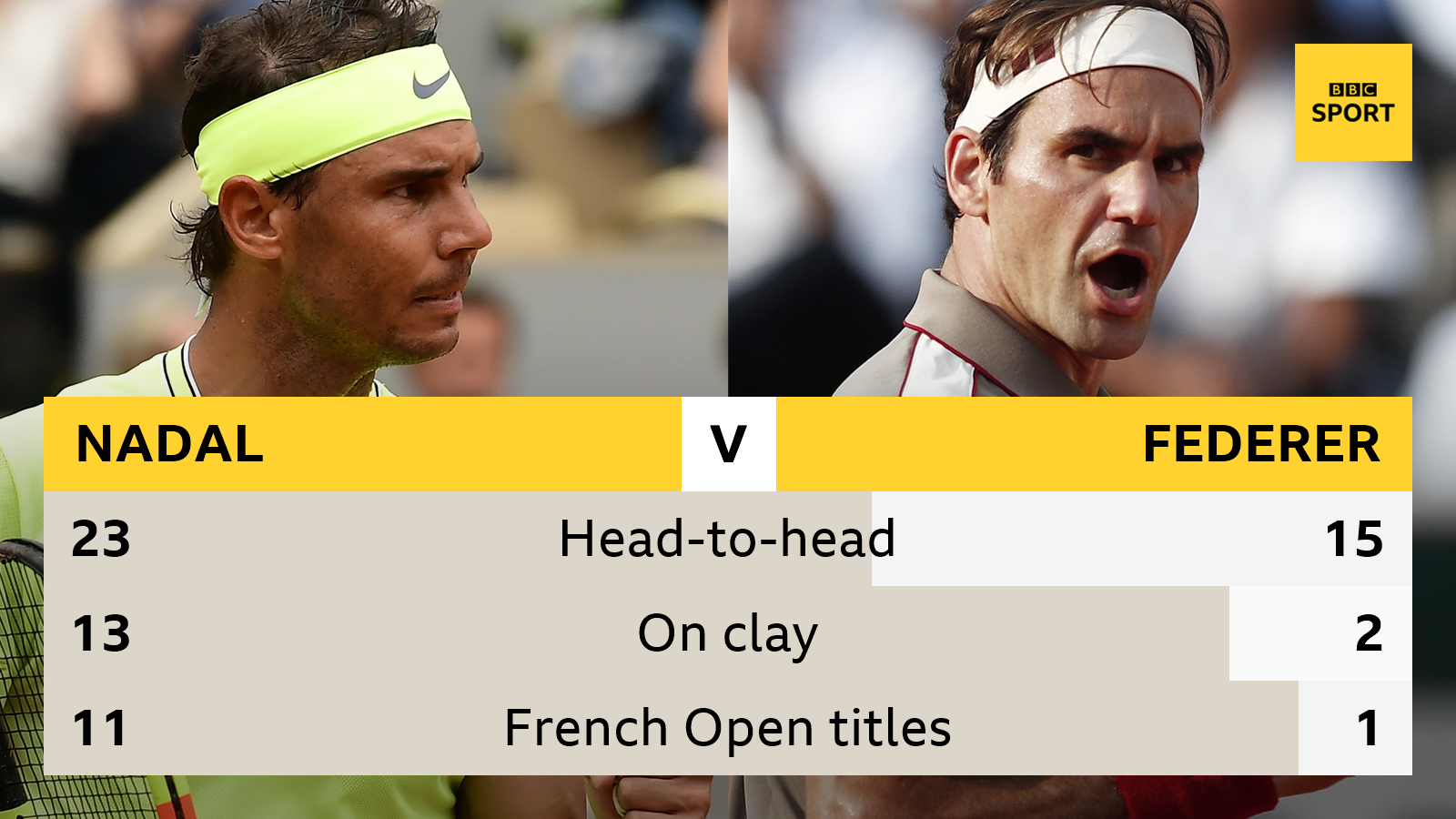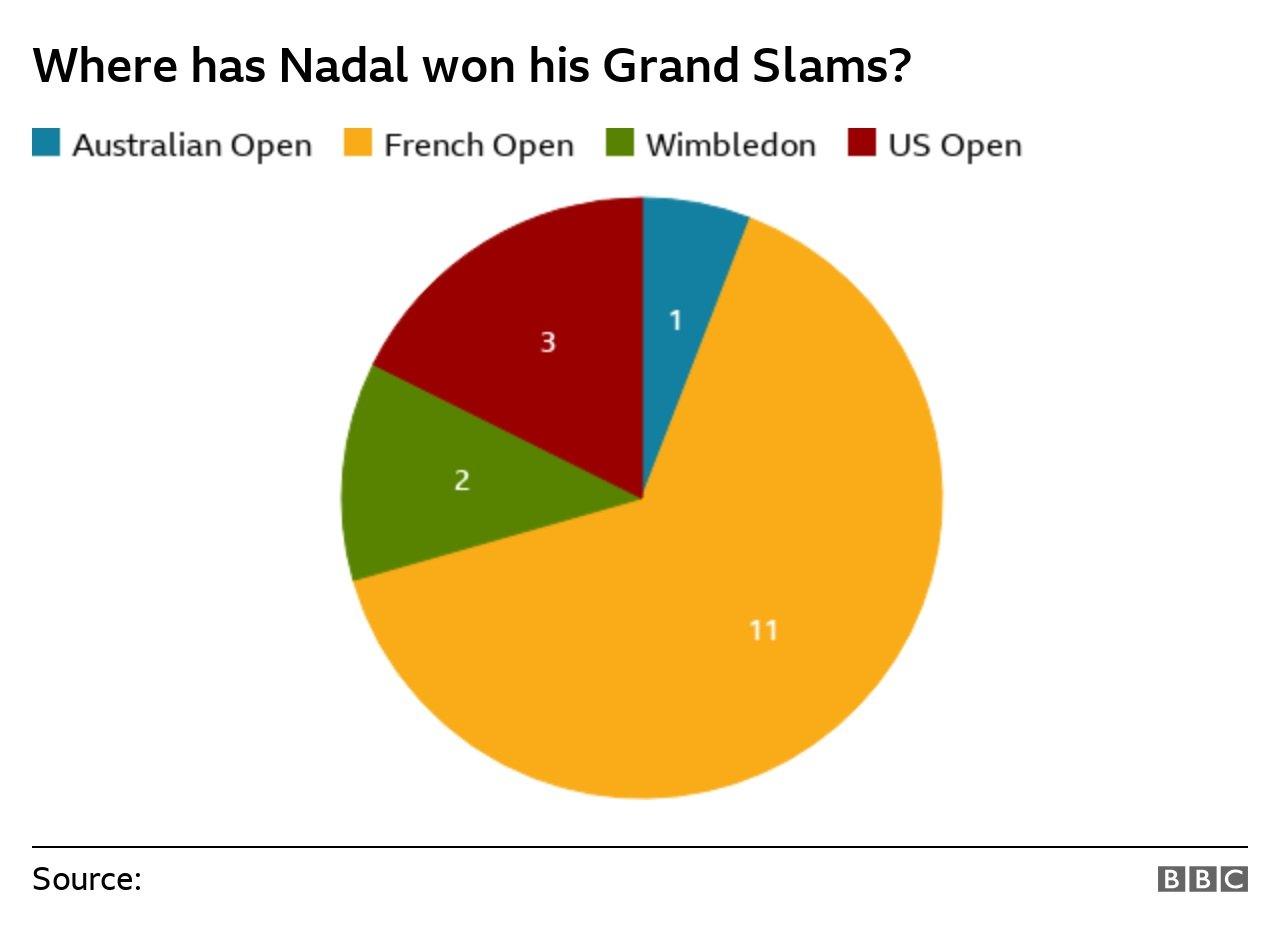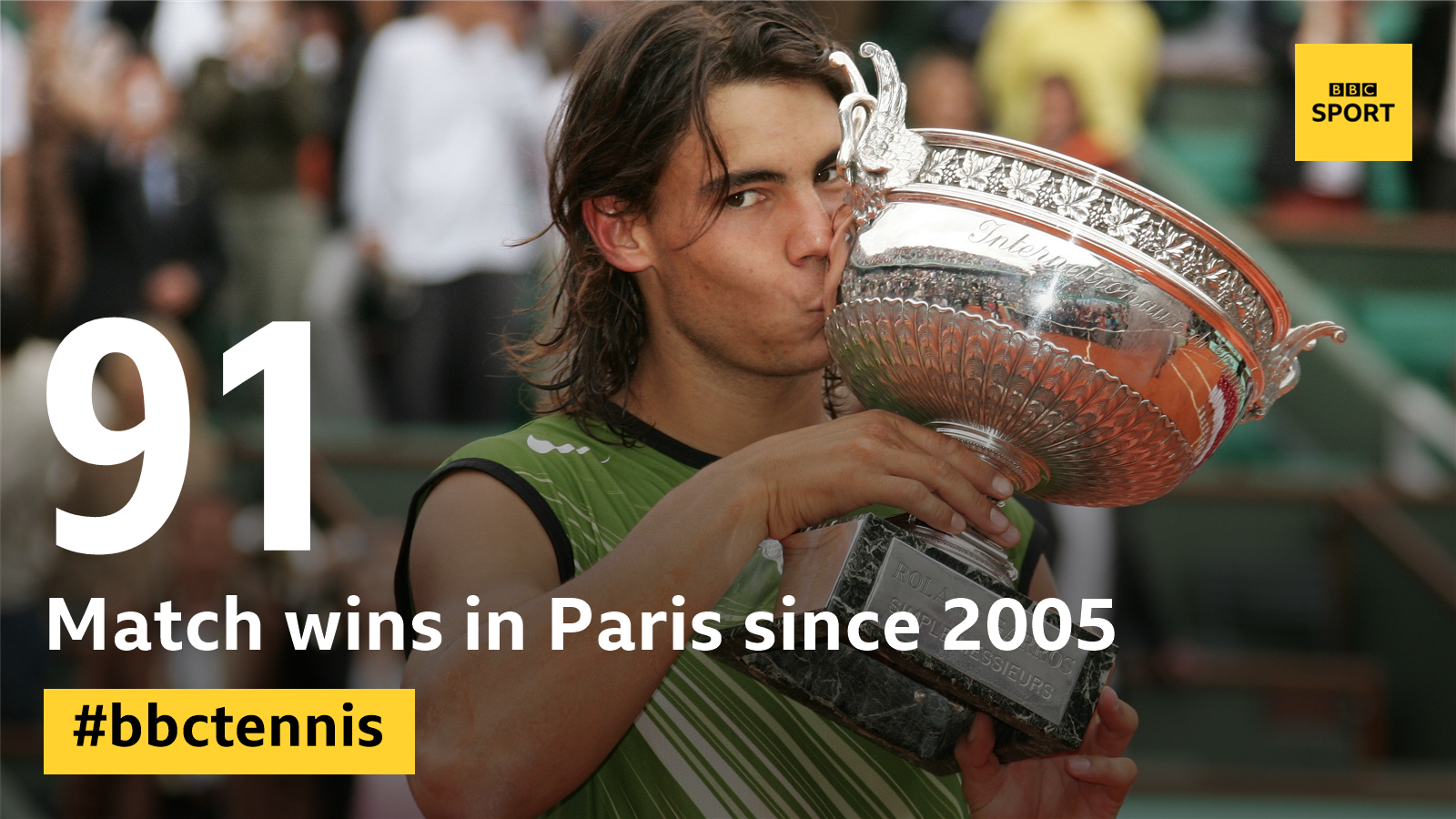French Open: How can Roger Federer beat 'King of Clay' Rafael Nadal?
- Published
- comments

Rafael Nadal has beaten Roger Federer in four finals at Roland Garros
2019 French Open men's semi-finals |
|---|
Venue: Roland Garros, Paris Date: Friday, 7 June Time: 11:50 BST |
Coverage: Live text and radio commentary on the BBC Sport website and app. |
"He might be sick. Maybe there's incredible wind, rain, 10 rain delays."
Roger Federer might have 20 Grand Slams to his name, but the Swiss knows he faces an almost impossible task in the French Open semi-finals - beating Rafael Nadal.
The defending champion, dubbed the 'King of Clay', is eyeing a record-extending 12th title at Roland Garros and has only lost two of 93 matches since his debut in Paris in 2005.
So what chance does Federer, whose only French Open title came a decade ago, have of beating Nadal in the last four?
"Like against any player, there is always a chance," said the 37-year-old.
"Otherwise, nobody will be in the stadium to watch because everybody already knows the result in advance."

Federer can take confidence from the fact he has overcome Nadal in their past five meetings, though he has only beaten the Spaniard twice in 15 attempts on clay and never at Roland Garros.
A 19-year-old Nadal won the first of those matches at the semi-final stage on the way to claiming his maiden Grand Slam in 2005, while his other four victories have all come in the final.
In fact, it is a decade since Federer got the better of Nadal on clay, beating him in Madrid in 2009 three weeks before lifting his only French Open crown.
It has been eight years since he last met Federer at the tournament, clinching the 2011 final in four sets.
The 33-year-old has not faced Federer at the tournament since the 2011 final, when he won in four sets, while the Swiss took just four games off his rival during their last meeting on the surface in Rome in 2013.
"I'm very happy to play Rafa, because if you want to achieve something on the clay, inevitably, at some stage, you will go through Rafa," added Federer.
"You never know. He might have a problem. He might be sick.
"You might be playing great or for some reason he's struggling. Maybe there's incredible wind, rain, 10 rain delays."
How do you beat the King of Clay?
Federer is playing at Roland Garros for the first time in four years, having missed the 2016 event with a back injury and skipped the past two clay-court seasons to preserve his body.
He made his return to the clay last month with runs to the quarter-finals in both Madrid and Rome, and dropped his only set of the tournament so far in a win over compatriot Stan Wawrinka in the last eight.
But Federer, the oldest man to reach a Grand Slam semi-final since 39-year-old Jimmy Connors at the 1991 US Open, has struggled to convert break points so far this tournament, taking just two of 18 against Wawrinka and only making 36% (20 from 55) in total.
He will be wary of the top-spin game possessed by left-hander Nadal, who has only dropped two sets since his last defeat in Paris four years ago.
"I'm looking forward to the test," added Federer.
"You have to be fearless to some extent to take on the spinny balls, the sliding balls, the kicking balls, and that's what I will do on Friday."

World number one Novak Djokovic was the last person to beat Nadal at Roland Garros, taking the 2015 quarter-final in straight sets, although Nadal did have to withdraw before the fourth round the following year because of a wrist injury.
The 33-year-old, who won five successive French Open titles before his straight-set exit to the Serb, returned in 2017 and has not lost a match on the Parisian clay since.
"I didn't want to give him too much comfort and opportunities where he can dictate the play," said Djokovic about his victory.
"I tried to mix up the pace, get into the net. Drop shots, high balls, fast balls, always something different. He made some unforced errors that are not characteristic for him maybe from the forehand side.
"But that's what happens when you don't feel comfortable on the court. I think because I played fast to his forehand and moved him around the court, he was a bit uncomfortable in his footing."
Six years earlier, Robin Soderling ended the then-world number one's 31-match winning run at the tournament by becoming the first man to beat him in Paris.
The Swede, who a month earlier had been thrashed 6-1 6-0 by Nadal in Rome, struck 63 winners in a four-set fourth-round victory.
"You have to play extremely well. To beat him on clay, the only chance for any player is to be really aggressive," said two-time beaten finalist Soderling.
"Take some risks. Many, many players, even good players, top players, you can almost see that they don't really believe 100% that they can win."
What does Nadal say?

Nadal won his first Grand Slam at the French Open as a 19-year-old, beating Mariano Puerta in the final in 2005
Nadal is into the French Open semi-finals for a 12th time and has won the tournament on each of the 11 previous occasions he reached this stage.
He saw off Japanese seventh seed Kei Nishikori 6-1 6-1 6-3 in under two hours to reach the last four of a Grand Slam for the 31st time.
Now he will play the 39th match against Federer in his career knowing victory will take him one step closer to an 18th major title - two behind the Swiss' total.
"Having Roger in the semi-finals is an extra thing," said Nadal. "We shared the most important moments of our careers together on court facing each other.
"So it's another episode of this, and I'm happy and excited. It will be a special moment."
Nadal already has five more French Open titles than his nearest challenger in the Open era - Sweden's Bjorn Borg, with six - while Frenchman Max Decugis won the last of his eight titles in 1914.
Three of Nadal's Grand Slam crowns have come since he turned 30, including back-to-back titles at Roland Garros.
"This won't last forever," he said.
"After all the problems I have faced, what keeps the flame alive is this desire, the desire to play on the main stages where I've been playing tennis for all these years."